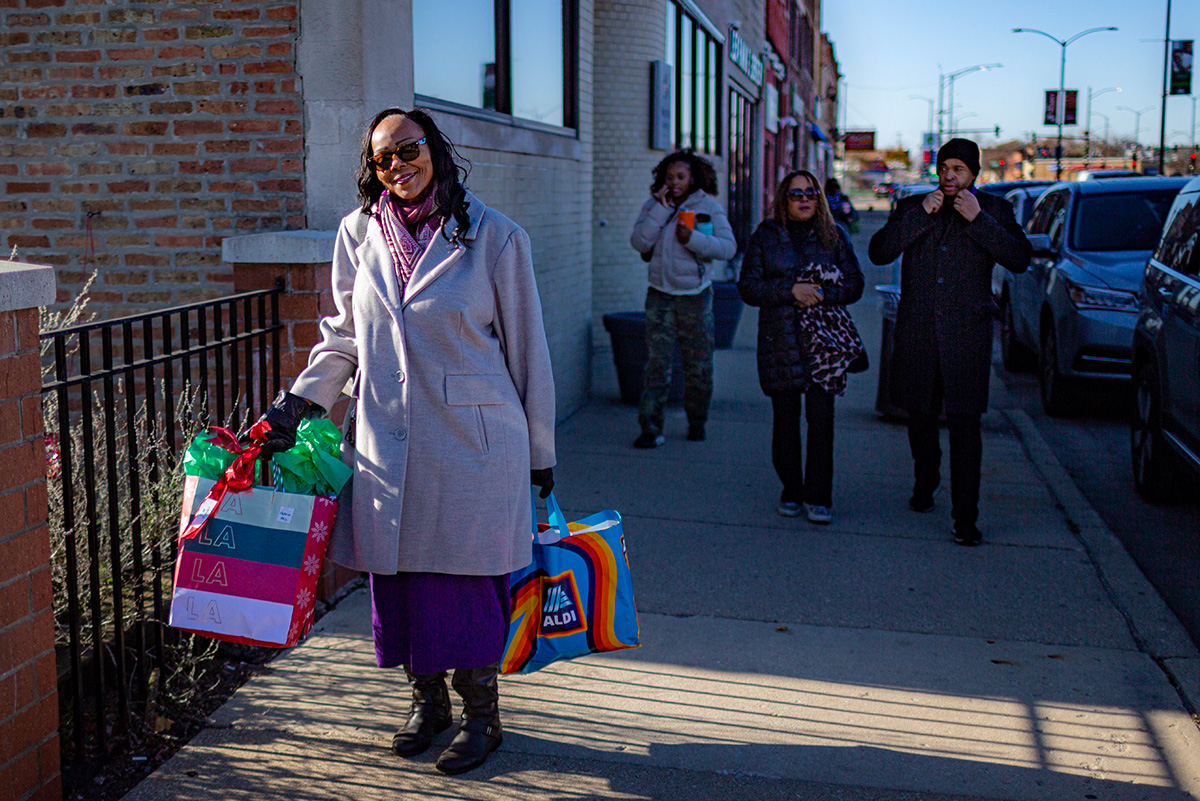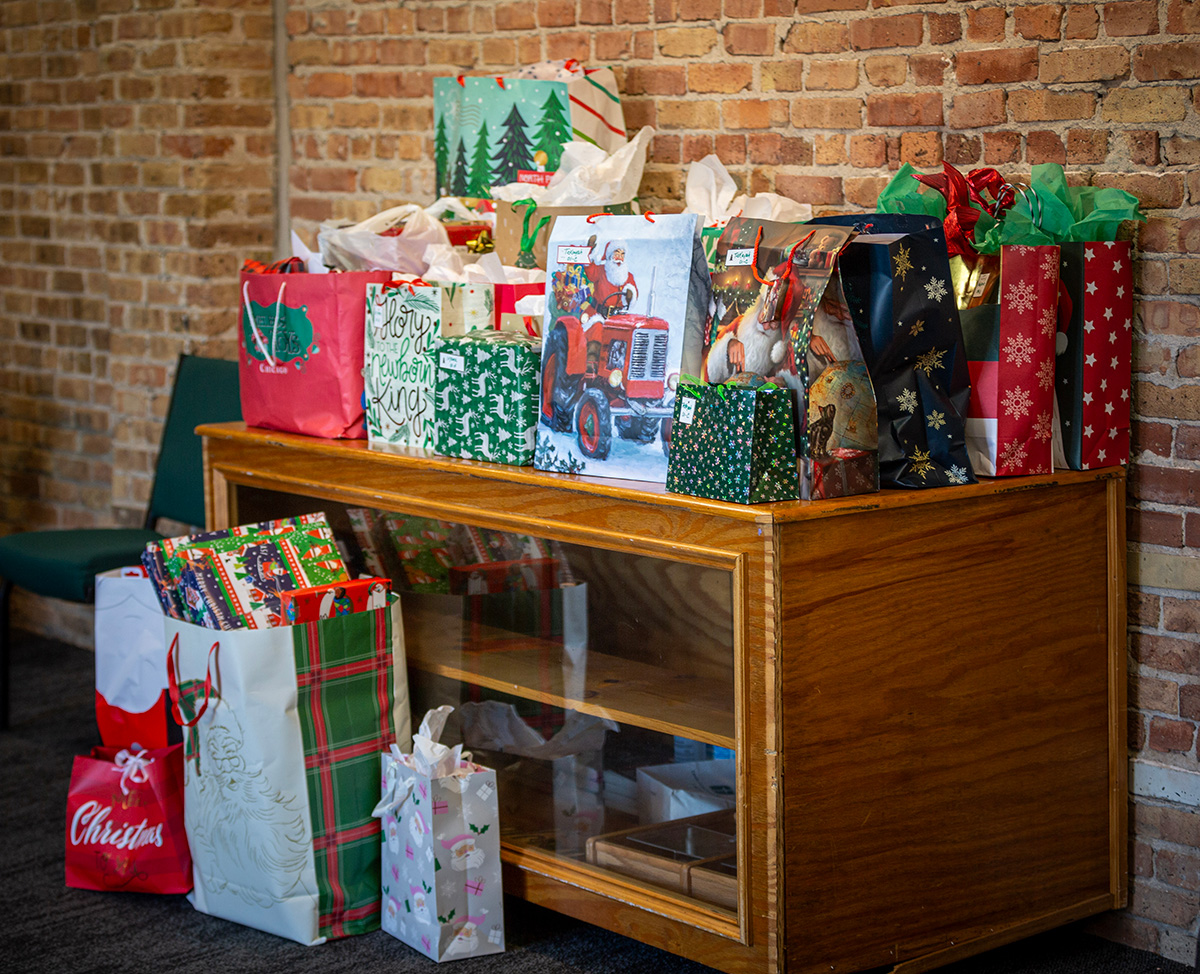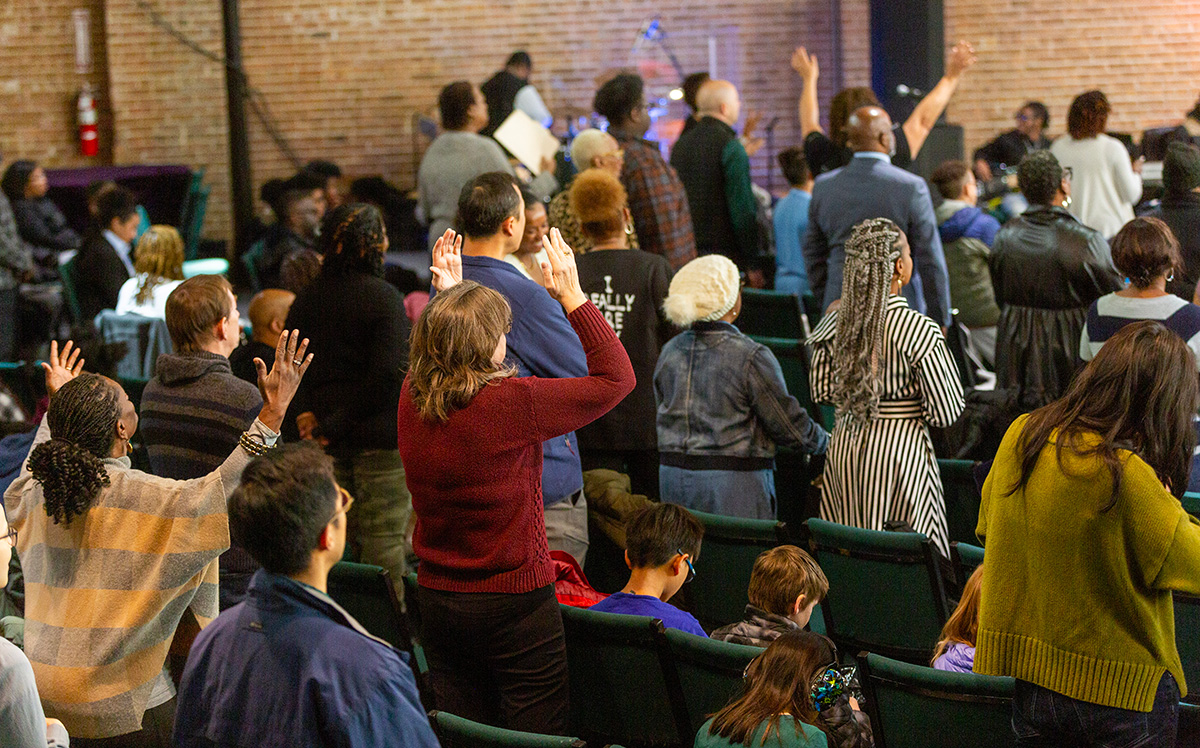Amid laughter and the sound of scissors crafting Christmas cards, half a dozen women from Lawndale Christian Community Church joined in fellowship on a recent Saturday morning.
In many ways, it seemed like an ordinary church hall scene — women and familiar laughter, friends discussing holiday plans.
But for Kenya Varnado-England, who became a member of the congregation this year, this church feels different from ones she’s attended before. Previous congregations felt businesslike, she said. But at Lawndale Christian Community Church, the fit feels more like family.
That’s intentional.
The church’s motto is “Loving God & Loving People,” and the Kingdom Women group Varnado-England met with that Saturday morning is one of many interconnected pieces of the church, where the goal is weaving people into the church’s many resources, spiritually and otherwise.
“At the core of our discipleship here at our church is that this is our neighborhood, God loves it, and we are called to steward it well,” said the Rev. Dr. Jonathan Brooks, the nondenominational church’s lead pastor.
On Ogden Avenue in Chicago’s North Lawndale neighborhood, the church’s signature logo — a green square with a cross and the LCCC acronym — can be seen on nearly every block, identifying the ministries woven throughout the community. Its efforts include legal care, through Lawndale Christian Legal Center; affordable health care, through Lawndale Christian Health Center; job training and small business development, through Lawndale Christian Development Corporation; and youth development with sports as well as arts and apprenticeship programs, through Lawndale Christian Community Church and the Firehouse Community Arts Center.
The church began in 1978, when its first pastor, Wayne “Coach” Gordon, having started a Fellowship of Christian Athletes Bible study, helped that core group of high school students realize the vision of becoming a church. In 2021, after decades at the helm, he passed the baton to Brooks.
Brooks, also known as “Pastah J,” preaches that where you live matters and you should serve that area well. Brooks said a student who helped found the church in 1978 asked a central question the congregation still asks today: “If Jesus commanded us to love our neighbors, doesn’t that mean we should love our neighborhood as well?”
Brooks said this is their main discipleship focus — following the greatest commandment of loving God and loving people. This is their neighborhood, and God loves it, so they too are called to love it well.
“We have a hundred families that live within a 1-mile radius of one another, where you can’t go anywhere without seeing and greeting and hanging with somebody,” Brooks said. “But then we also decide to work together.”
What would be different if we really believed that God loves our neighborhood?

Christmas ministry as part of a holistic effort
This Christmas, the church is partnering with the Chicagoland Prison Outreach (CPO) Angels of Hope program to support families with incarcerated relatives. Started several years ago, the program is a prime example of the congregation’s intentional work within the community.
Many churches give away gifts at Christmas to people in need, but at Lawndale Christian Community Church, the Christmas effort is part of a holistic approach to working with families.
In previous years, the church’s gifting program was a bit different, focused primarily on gift buying and delivering. Under Brooks, it’s taken on an integrated community approach. Members still select and buy gifts, dropping them off at the church on Sundays. But the recipients are chosen by CPO and church leaders, who select five families in the church’s ZIP code with relatives incarcerated in Cook County Jail. The church serves a bit like elves, delivering the gifts to the families on behalf of the incarcerated family member, rather than the church, Brooks said.

All year long, they work with the families to help them stay connected while a parent is in prison. Once an inmate is released, the church continues to help through its multiple community resources, such as its Hope House Men’s Recovery Home Program for men reentering society after prison or substance abuse. They provide assistance with getting jobs, through partnerships like the one with local restaurant and famed deep-dish pizza spot Lou Malnati’s, which has a location near the church.
All of this supports the families, the parents returning from incarceration and the community, explained Chelsea Johnson, who is Brooks’ assistant. The goal, she said, is to shower people with support and show families what is near them, logistically and spiritually.
It takes time for families to build trust, she said, and to know that the help is not just a one-time reach-out.
“We want to keep the same families, because we’re trying to build that relationship,” she said. “We’re committed. We send them a letter throughout the year, ‘Hey, just checking in on you. Any way we can be of support to you? How are the kids doing?’ Calling them by name, which is very important.”
The gifts were delivered Dec. 3. This thoughtfulness is intended to help foster ongoing relationships with the incarcerated person’s family, while also building a relationship with the parent while they are in jail.
“So that when they come out, what we see is when they come to Hope House, their family also is coming to Lawndale Church,” Brooks said. “Now we have the reunification of family. We have vocational opportunities for them to work right here in their own neighborhood. We have opportunities for education and to get back on track for you to be a light where you existed in darkness.”
“It’s like little nuances that stream through in various ways,” he said.
What does an integrated community approach look like in the way you care for your neighbors?

The church and community as an ecosystem
North Lawndale, on the city’s West Side, is a neighborhood with single-family homes and apartments as well as vacant lots and storefronts. North Lawndale has a median household income of about $30,000 and was included in a $75 million program to build more housing and reverse population decline. It is also one of 10 communities in an investment strategy of the city to reactivate neighborhoods, with the priority being Ogden Avenue, where the church is based.
The church preaches a vision with a shared future where residents live in harmony and security, vacant lots are converted to affordable homes, and jobs are abundant. Indeed, the church has created some of this vision with its real estate. Still, often, people go away to college and don’t return to North Lawndale; church leaders want those folks to come back and see it as a place to find jobs and raise families.
Their programming reflects this approach. The church offers classes to the congregation in a certain order, beginning with discipleship of self and moving on to learning about helping the community. The sequencing is important, Johnson said.
“You’ve got to first have it in yourself,” she said. “Your own discipleship is going to help you carry out being compassionate to people. … You begin to understand the importance of sharing a burden.”
Under Brooks, the church leadership has intentionally begun to shift some responsibilities to church membership, having people help with everything from volunteering to hospitality. Before, Johnson said, church leadership handled almost everything. Now, Brooks is showing them how to involve the membership more.
“There’s so many creative and gifted people sitting right in our congregation on Sundays. Why not reach out to them?” Johnson said.
Since beginning decades ago, the congregation has grown in both membership and physical footprint. Lawndale Christian Community Church has around 700 active members but also provides pastoral and congregational care for the broader community. For example, they host funerals for anyone in the community at no cost.
The annual church budget is a little over $1 million, Brooks said. Nearly 90% of the membership resides in the North Lawndale neighborhood, he said, and more than 100 families reside within a 1-mile radius of the church campus.
How does your church contribute to building a neighborhood in which young adults want to work and raise their families?

On the same street as the church is the Green Tomato Cafe, a ministry of Lawndale Christian Health Center, which offers affordable, healthful food. Also nearby, the health center’s Farm on Ogden facility provides jobs as well as food through its urban agriculture program. And the Lawndale Christian Health Center itself is a huge presence on the corner, offering services from senior care to eye exams through 10 locations.
Willette Grant, the church’s hospitality coordinator, has been part of the church since 1989. She remembers when they had a track program for kids as young as 7 years old.
“It’s a beautiful ministry,” she said.
Programs like Angels of Hope, she said, serve a higher purpose than just making folks a little happier at Christmastime.
“We’re here to love you and for you to know us, and it’s not about making people feel belittled but loving them into the kingdom,” she said.
Brooks sees their work in the community as an ecosystem — where all the pieces and programs work together to make people’s lives better and, in turn, make the community thrive.
People may visit the church, then cross the street to the church’s legal center or fitness center or to seek mental health support. Right next door to where Kingdom Women meets is a room with multiple resources for children, including books like “My Very Own Bible” and “Let’s Make Shapes.”
All of this is intentional.
“That ecosystem is what allows people to say, ‘Oh, I want to be a part of this health center, because they also helped me find housing,’” Brooks said. “Same thing about, ‘I want to be a part of this church because, wow, coming to this church got me connected to health care and housing and better food options.’”
“To me, that’s the gospel,” he said. “That’s the gospel in action.”
‘Invest rather than escape’
Before joining Lawndale Christian Community Church, Brooks was pastor at Canaan Community Church in Chicago’s Englewood neighborhood for 15 years. There, he noticed how many parishioners had grown up in the neighborhood but then moved away, often driving in on Sundays from the suburbs. He wanted the neighborhood to be a place where people could see themselves staying and growing.
“We want our neighbors to see our neighborhoods as places to invest rather than escape,” he said. “We want to offer opportunities to come back, buy a home, start a career and raise a family right here in our communities.”
Does your church play a role in the ecosystem of your neighborhood?

Brooks himself grew up in Englewood, where he absorbed the message that he should get out of the neighborhood. He said that residents of neglected neighborhoods often go away to college or move away and never return.
In fact, it’s such a norm that it is “actually seen as a sign of success to leave the community,” he said.
Indeed, he followed that path himself, until he came home to take care of his mother and his attitude about Englewood began to change. Pastoring showed him he wanted to build a church in love with its neighborhood, he said.
Brooks also teaches at Northern Seminary and Trinity Christian College. His background includes a bachelor of architecture degree from Tuskegee University, a master of arts in teaching from National Louis University, and master of divinity and doctor of ministry degrees from Northern Seminary. He, his wife, Micheál Newman-Brooks, and their two children live just a few blocks from the church. They moved to Lawndale when he became pastor.
His interests are as varied as the church’s properties. He wrote a book about his approach to ministry, “Church Forsaken: Practicing Presence in Neglected Neighborhoods,” and has recorded a mixtape to accompany it.
With Canaan, he launched the Kusanya Cafe in Englewood, after a group of residents said they wanted a space to meet but the only spots nearby were fast food. To fix this, they created a nonprofit cafe; Kusanya is Swahili for “to gather together.”
At Lawndale Christian Community Church, Brooks’ commitment to intentional neighborhood continues. And in conversations with congregants, intentionality is a theme that comes up over and over.
The health center not only provides medical treatment but also steers people to fresh fruits and vegetables. During the migration crisis in the city in 2022, the church’s Casa de la Esperanza, a temporary shelter housed in the Hope House building, became a sanctuary for pregnant immigrants, helping them with everything from pregnancy care to postpartum support. Brooks said they provided 800 medical visits and cared for 67 new babies.
The latter meant a lot to Rosa Bedoya, who grew up nearby and has attended the church for decades, raising her now grown son within it. She comes Saturday mornings to Kingdom Women and appreciates the fellowship. She leaves reminded to count her blessings and taking lessons from everything the church is doing in the neighborhood.
She has been helped by the church spiritually, lifted by the fellowship opportunities, as well as physically, inspired to cook more healthfully by the box of fresh fruits and vegetables she picks up each week at one of the church locations. She and her husband feel better, she said, after making these changes to their lives.
“Every Saturday, I go home inspired,” she said.
The recent Saturday morning when Kingdom Women met, Varnado-England discussed Angels of Hope gift shopping plans in an easy camaraderie with these women she has known for years, growing up and seeing the same women around the neighborhood.
She purchased gifts for a 12-year-old. She participated in the gift giving last year too.
“Anytime I can help a little kid, I’m willing,” Varnado-England said. “I try to do my best to give back.”
Varnado-England said it’s important to her that gifts are given without any expectation of something in return. The motivation is not that people should come to church; nothing should feel owed. Varnado-England simply wants them to know they are part of the community.
Her hope, she said, is that “they remember it throughout the year and understand there are people out here who are willing to help and be a blessing to others without wanting anything in return.”
Sally Hicks contributed to this report.
What would it look like for your church to be “in love with its neighborhood”?
Questions to consider
- What would be different if we really believed that God loves our neighborhood?
- What does an integrated community approach look like in the way you care for your neighbors?
- How does your church contribute to building a neighborhood in which young adults want to work and raise their families?
- Does your church play a role in the ecosystem of your community?
- What would it look like for your church to be “in love with its neighborhood”?























